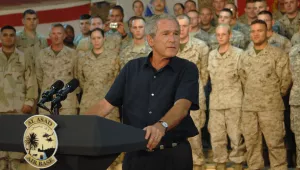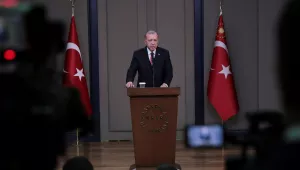"Who wants to be occupied? Nobody wants to be occupied."
— President Bush, May 7, 2004
WITH THE release of the Iraq Study Group's report and pending completion of two inter governmental reviews, a US policy change in Iraq is inevitable. The key to this policy change, in order to salvage the reputation and relevance of the United States, should be a new strategic shift based upon the principles on which America was founded -- a doctrine of non occupation.
President Bush should frame America's Iraqi withdrawal as a central component of an updated American foreign policy. Put simply, he needs to reemphasize a commitment to the Truman Doctrine, which declared that it is "the policy of the United States to support free peoples who are resisting attempted subjugation by armed minorities or by outside pressures."
While announcing his new Iraq strategy, President Bush should declare this non occupation doctrine thusly: "It will be the policy of the United States to refrain from employing its military forces to occupy other sovereign states, and oppose any other state from the armed occupation of another state."
A non occupation doctrine would serve America's foreign policy in four ways:
First, it would help to right the 3 1/2- year wrong of America's open-ended occupation of Iraq. Deputy Defense Secretary Paul Wolfowitz told an assembled group of Arab-Americans two months before the war of the "overarching principle . . . If the president should decide to use force, let me assure you again that the United States would be committed to liberating the people of Iraq, not becoming an occupation force."
Today, Iraqis increasingly want the United States out: 78 percent contend that American troops provoke more conflict than they prevent, and 61 percent support attacks on American soldiers.
Second, by making the opposition to military occupation a principle of US foreign policy, it would end a vital rallying cry of Al Qaeda and its affiliates. Serious scholars and policy analysts agree that nothing further unites and expands the international jihadist movement more than the prospect of opposing a perceived foreign occupation of Islamic lands.
Third, outside military forces that control a foreign territory end up tarnishing the political character of that country. They employ violence to achieve their goals, retard social and economic development, and inevitably incite armed resistance. These dismal problems are caused by India in Kashmir, Morocco in Western Sahara, Turkey in Northern Cyprus, and Israel in Palestine. The United States should offer a full array of diplomatic incentives to resolve these foreign occupations.
Fourth, it is simply antithetical to America's political character to tolerate military occupations. The American Revolution firmly established the principle that foreign rule was inherently ignorant of local conditions, unwelcome, and unjust.
There should, of course, be exceptions to a non occupation doctrine: international peacekeepers or foreign militaries authorized by the UN Security Council, peacekeeping or stability operations recognized by the consensus of international organizations such as NATO, short-term humanitarian interventions intended to prevent future mass killings such as the British intervention in Sierra Leone in 2000, and deployments welcomed by the recognized government of a state.
In an interview with Bob Woodward last summer, then-Secretary of Defense Donald Rumsfeld stated the obvious: "I've always felt that foreign troops are an anomaly in a country, that eventually they're unnatural and not welcomed really. There's also the concept of declining consent."
The former Pentagon chief was wholly correct in his diagnosis, if largely inept in its implementation. Perhaps Robert Gates can impress upon President Bush, much as George Marshall did upon President Harry Truman, the need to declare a non occupation doctrine that heralds a renewed support for free peoples everywhere living under foreign occupation.
Micah Zenko is a research associate at the BelferCenterfor Science and International Affairs at the KennedySchoolof Government at Harvard and a doctoral candidate at BrandeisUniversity.
Zenko, Micah. “Get Everybody's Troops Out of Everywhere.” The Boston Globe, December 24, 2006





